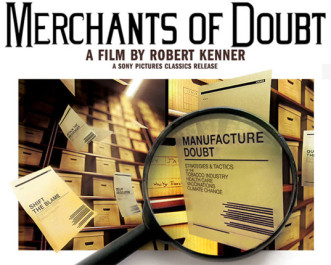 “This film has been carbon off-set.” Thus conclude the credits of the documentary Merchants of Doubt, which takes the simple conceit that global warming skeptics are in the pockets of the Koch brothers and the rest of the deceitful fossil-fuel industry, beats it into fine particulates, and blows it up the audiences’ collective left nostril—because the film appeals only to the hardcore believers, or “zealots” if you prefer.
“This film has been carbon off-set.” Thus conclude the credits of the documentary Merchants of Doubt, which takes the simple conceit that global warming skeptics are in the pockets of the Koch brothers and the rest of the deceitful fossil-fuel industry, beats it into fine particulates, and blows it up the audiences’ collective left nostril—because the film appeals only to the hardcore believers, or “zealots” if you prefer.
Your writer isn’t the first to make the analogy that the religious nature of the “global-warming is real, humans contribute to it, and we must put all economic development on hiatus and strand all fossil fuels in the ground” contingent, nor will he be the last. Since the talking heads in Merchants of Doubt throw around the remarkably offensive “climate-change denier” phrase willy-nilly, I hold no reservations in deploying the far more benign term zealot in return.
In the interest of full disclosure, I should admit that I once wrote for The Heartland Institute’s Environment & Climate News, edited MichiganScience magazine for the Mackinac Center for Public Policy, and have enjoyed the company of Heartland’s James Taylor on enough occasions to declare he’s a great cigar companion although warning readers to never, ever make the mistake of sitting across a poker table from him.
So, it amuses me that films such as Merchants of Doubt are made at far greater monetary expense to the zealots than the reputational damage to Heartland, Taylor, Fred Singer, Steve Milloy, Marc Morano, and the host of others targeted in the film, while also landing with a resounding thud at the box office. The film’s less than boffo ticket receipts also amused me after listening to a recent Citizens Climate Lobby broadcast containing Naomi Oreskes’ prediction the film would become “a game-changer” in the climate-change debate. Who she, you might ask? Oreskes features prominently in the film adaptation of her book of the same title, Merchants of Doubt, cowritten with Erik M. Conway and published a half-decade ago. That’s so 2010, as the kids might say.
According to the film, climate-change skepticism borrows the very same tactics honed by the tobacco industry in decades past, leading (the filmmakers hope) to the conclusion anyone daring to question global warming is part of a grand conspiracy of anti-science boobery and capitalist treachery. Seriously, the only people who could take such accusations sincerely are those who already have purchased the boat ticket and taken the trip over the waterfall. Merchants of Doubt director Robert Kenner take note: As a purveyor of agitprop you’re no Leni Riefenstahl.
The film shows many people discussing “the science” but nary a segment containing compelling evidence the titular Merchants are wrong. Instead, the latter are depicted simply as employing sleight-of-hand rhetoric and relying on questionable funding in one of the most annoying framing devices ever committed to celluloid: magician Jamie Ian Swiss displaying card tricks and levitating woman as visual metaphors for daring to question the non-consensus consensus that human activity is dangerously warming the planet.
What this amounts to is one huge celluloid hissy fit thrown by zealots who are alarmed that smart people, including real scientists, brave politicians, and reputable think tanks, stand in the way of a gullible public granting them policy carte blanche.
Yes, skeptics in Merchants of Doubt are raked over the coals repeatedly. Stanton Glantz states that “giant corporations” are behind the scientific skepticism, and he states that these corporations are “rich, politically powerful, and mean.” In this universe (an alternate universe, according to the filmmakers, resembling a classic episode of the original Twilight Zone television series, another thuddingly lame simile), Snidely Whiplash is the skeptic and the zealots are Fair Nell tied to the railroad tracks as the steam locomotive of carbon emissions threatens to snuff her.
Forgive the pun, but this is where Merchants of Doubt really goes off the rails. It simply attempts to stuff too many topics into its 90-minute running time without presenting a cogent scientific argument (sorry, Naomi, but the whole “scientific consensus claim” was debunked a long time ago) against any of them. Are we in the audience supposed to cry, for example, over the fact that someone stepped up to defend the use of DDT and genetically modified organisms? I certainly hope not, because real science has found little to discredit the former and nothing to discredit the latter, and both have been tremendously beneficial to the world’s poorest countries. Could it be that Kenner and Oreskes are just as wrong when it comes to global warming?
Finally, how can Kenner, Oreskes, and their posse possibly keep straight faces when declaring climate-change skepticism to be more about politics than science when the topic was politicized long ago by NASA scientist James Hansen and the UN’s Intergovernmental Panel on Climate Change? Is it any wonder the film sank without much of a trace after its April 2015 release?

